Papers by Julia K Callander
Teaching Documents by Julia K Callander
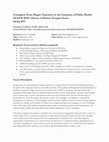
In this course we will study literary representations of contagious disease from the Early Modern... more In this course we will study literary representations of contagious disease from the Early Modern period to the present day, using these texts as case studies for many of the political, philosophical, and aesthetic ideas of the first two quarters. Plague narratives are an ideal arena in which to investigate the legal, ethical, and conceptual relationships between individual subjects, bodies, and the "body public," questions about human nature and the state of nature, and questions about how governments form and what the best types of government are. We'll also analyze how disease in these texts highlights or complicates contemporary conceptions of "otherness," and how plague narratives produce different narrative frameworks (providential, rational, etc.). Finally, we'll consider how these texts metaphorize illness and contagion as a way of thinking about other topics (for example: colonialism, print culture, revolutionary politics, and moral decline)-but we'll also think carefully about the ethical and aesthetic implications of those metaphors. This class is capped at 18 students to facilitate active discussion and engagement with each other's work; it is a class which focuses on discussion and process rather than lecture and evaluation. In this class, through a variety of discussion and writing activities and assignments, you will learn how to develop insightful, argumentative interpretations of a variety of texts and then how to communicate these interpretations in a clear and compelling way. In fact, these two goals are inextricably related. You will find that these analytical and writing skills will be useful to you no matter what professional field you plan to enter.
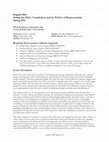
From Silence of the Lambs and True Blood, to The Walking Dead and the media buzz about bath salts... more From Silence of the Lambs and True Blood, to The Walking Dead and the media buzz about bath salts and face-eating, contemporary culture is brimming with representations of humans being consumed by marginally human creatures. That these particular baddies have been the object of fascination for centuries suggests that they're more than just good scary fun. This course aims to unpack some of the cultural work of these images and stories: Where does one draw the boundary between a human and a monster? Between the self and another? How are anxieties about capitalism projected onto the body of the individual consumer? How do these representations affect the ways in which we understand gender, sexuality, and racial difference? This seminar will focus on texts (journals, novels, stories, poems, plays, and films) from the past three centuries in North America and Western Europe. We will begin by reading several important Early Modern texts about cannibals, paired with the work of anthropologists, philosophers, and other critics, to provide a framework for our investigations of cannibalism. From there, the focus will turn first to ethnographic writings which use consumption to establish or deconstruct racial difference, and then to texts in which the consuming or consumed body is implicated in the construction of gender and/or sexuality. Ultimately, this course is designed to introduce you to the field of food studies through a more specific thematic focus on cannibalism and difference, and a methodological reliance on the close reading of literary texts. There are no prerequisites for this class, but university-level composition skills and a willingness to jump into new materials and approaches will be expected. This class is capped at 15 students to facilitate active discussion and engagement with each other's work; it is a class which focuses on discussion and process rather than lecture and evaluation. In this class, through a variety of discussion and writing activities and assignments, you will learn how to develop insightful, argumentative interpretations of a variety of texts and then how to communicate these interpretations in a clear and compelling way. In fact, these two goals are inextricably related. You will find that these analytical and writing skills will be useful to you no matter what professional field you plan to enter.
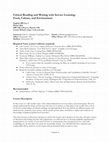
In this course we will consider some of the relationships between food, culture, and environment.... more In this course we will consider some of the relationships between food, culture, and environment. How do people understand the things and the ways that they eat in relation to their place in the world? How is food involved in relationships of cultural exchange and appropriation? How do authors use different genres and media (novels, memoirs, short stories, critical articles, poems, plays, and films) to depict and comment on increasingly complicated global food networks? This class focuses on discussion and process rather than lecture and evaluation. In this class, through a variety of discussion and writing activities and assignments, you will learn how to develop insightful, argumentative interpretations of a variety of texts and then how to communicate these interpretations in a clear and compelling way. In fact, these two goals are inextricably related. You will find that these analytical and writing skills will be useful to you no matter what professional field you plan to enter.
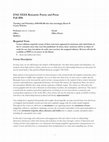
In many ways, we are still living in the shadow of Romanticism. Our ideas about genius and inspir... more In many ways, we are still living in the shadow of Romanticism. Our ideas about genius and inspiration, our anxieties about high and low culture, and the way we think about the relationships between art and nature all can be traced back to this period in British literature (roughly 1780-1830). Many authors in this period are known for their elevation of the natural world, the English countryside, and a particular kind of middle-class simplicity. Yet, as we delve into their texts, we may come to realize that the Romantic focus on the local and the rural is in fact a strong reaction to the turmoil of these writers' historical moment: industrialization, unprecedented literacy, the French Revolution, the Napoleonic Wars, the end of the transatlantic (British) slave trade and the expansion of British empire. The writers we will read in this course grappled with the role of literature in relationship to politics, the marketplace, and history. They had to contend with the aesthetic and ethical implications of writing in an ever more diverse, connected, and cosmopolitan experience of the world. Who, these writers ask, has the authority to speak on behalf of others, and what is the relationship between political and literary representation? Our reading list is organized thematically and roughly chronologically, moving outward from texts that focus on England (and Scotland!) toward texts that more explicitly engage with the world outside England. Throughout the course we will focus on circulation as an organizing theme: the circulation of texts (plagiarism, influence, translation, reprinting, revision, the economics and politics of the print marketplace) as well as the circulation of goods, ideas, diseases, and bodies due to empire, tourism, and global trade— including the transatlantic slave trade. In this class I encourage active discussion and engagement with each other's work; we will privilege discussion and process rather than lecture and evaluation. In this class, through a variety of discussion and writing activities and assignments, you will practice developing insightful, argumentative interpretations of a variety of texts and then how to communicate these interpretations in a clear and compelling way.
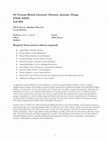
In eighteenth-century Britain, the very definition of a person was profoundly unstable. On the on... more In eighteenth-century Britain, the very definition of a person was profoundly unstable. On the one hand, enlightenment thought and scientific revolution fueled a great deal of optimism and faith in the individual's rights, abilities, and autonomy. On the other hand, some of those same scientific concepts threatened to undermine the individual—if " man " is just another animal made out of atoms, people reasoned, how do we delineate what it means to be human? These questions were further complicated by the unprecedented contact among different groups of people due to class mobility; improved literacy and education; and the expanded reach of commerce, empire, and the transatlantic slave trade. Questions about the very nature and interrelation of humans, animals, and objects intrigued and troubled writers throughout the period. In this course, we will focus on Restoration and eighteenth-century texts about animals, women, slaves, the poor, and other groups seen as having marginal claims to subjectivity (as well as objects, which were often also accorded provisional subjectivity!). We will see that many of these texts also attempt to theorize the relationship between objects and beings—that is, they address desire and disgust, sexuality, and economic transactions (alternate course title: " The Dirty, Greedy, and Horny Eighteenth Century "). We will explore these literary texts in their political and philosophical contexts, including intellectual and cultural movements such as materialism, epicureanism, posessive individualism, sympathy, and abolitionism.
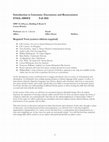
In this introductory course, you'll learn how to engage with literary texts as sources of both pl... more In this introductory course, you'll learn how to engage with literary texts as sources of both pleasure and information. You'll practice close reading (paying attention to literary language itself), acquire a toolbox of basic literary elements (figurative language, tone, diction, allusion, plot structure), learn how to scan poetry (for meter, rhythm, rhyme, and sound), and develop your ability to situate literature in its historical context. You'll also develop your understanding of different literary genres as well as honing the skills that will help you read and write critically and clearly. In this section of the course, we will focus on encounters between dissimilar beings. How do authors represent the experience of meeting someone unlike oneself? How do these encounters impact the forms of writing by which they are communicated? And what are the ethical implications of representing " Others " ? Some of the topics we will be exploring are colonialism and travel; religion; human-animal relations; and the intersections of race, gender, and sexuality. This class focuses on discussion and process rather than lecture and evaluation. In this class, through a variety of discussion-and writing-based activities and assignments, you will learn how to develop insightful, argumentative interpretations of a variety of texts and then how to communicate these interpretations in a clear and compelling way. In fact, these two goals are inextricably related. You will find that these analytical and writing skills will be useful to you no matter what professional field you plan to enter.







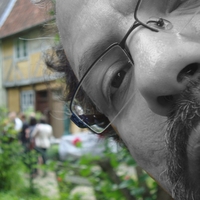


Uploads
Papers by Julia K Callander
Teaching Documents by Julia K Callander